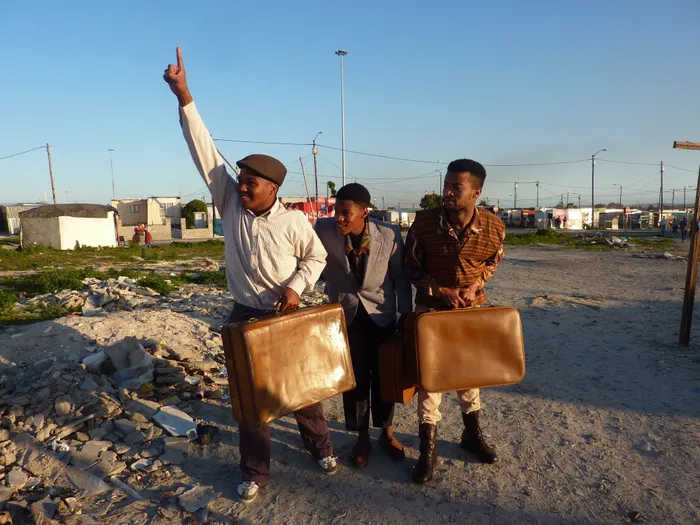
THERE are musicals aplenty on stage at the moment. Joseph has returned with his Amazing Technicolour Dreamcoat and is thrilling a new generation of audiences with a revamped show at Theatre on the Bay. In the city bowl Hedwig and the Angry Inch are about to debut at Gate 69 and Annie is on the horizon. Slipping quietly on to the stage at the Theatre Arts Admin Collective is Egoli – The Musical. Billed as a Xhosa musical narrated in English this has no thundering soundtrack, extravagant costumes or technical wizardry.
Instead you are led gently from the quiet village of Lusikisiki in the Eastern Cape to the torrid and teaming City of Gold: Egoli. As is the case in many rural communities in SA poverty is a constant companion and the allure of the big city and the financial promise of urban living entice many people to head to the metropolitan centres in search of fame and fortune. The opening sequence laments the loss experienced by families torn apart by the economic imperative and reveals a candid glimpse of the hardships faced by rural communities. The candid reality of a life of hard labour that doesn’t always result in prosperity, this vignette of village life is no bucolic paradise. Here we meet Gaba (Dakuse), a man who becomes increasingly frustrated with the absence of prospects in his village.
His long suffering wife Madlamini (Jacobs) become a gold widow, left behind when he heads to the mines. At home he seems to be somewhat of a ne’er-do-well and unfortunately arriving in Joburg he navigates to the underbelly of the city and is quickly seduced by the temptations of the metropolis.
The contrast between the village and the city is evoked subtly through tempo in singing and the change of attire. The transition from easily recognizable traditional wear to city slick is as effective as a change in backdrop. It is impossible to watch this poignant and nuanced drama without thinking of other miners, specifically those of Marikana who never returned home. Although this is a story of one man lost to the system, it reverberates with the untold stories of the flood of migrant labour, used by the cities and either spat out or consumed whole.
It is the sound of Jacobs’ deep laments that captures the sorrow of generations of women left behind. The songs are sung in Xhosa and there is an occasional interjection by an English speaking narrator. As with watching Italian opera, understanding the language of performance is not a prerequisite to appreciating the depth of emotion and the quality of these performances. The voices are exquisite and the choral harmonies are beautifully executed by a talented cast. The staging is simple and a single bench at Park Station becomes a central point around which people rush and race in search of their city dream.
Egoli has been a labour of love for Titana since it premièred at the Ikhwezi Festival. The show was revised and selected for the 2015 Zabalaza Festival, where he was recognized as Best Musical Director. His tenacity in developing the script and the cast is a testament to directors who work tirelessly in pursuit of their creative dreams. In addition to performing at schools the show will run at the Masque before moving to Novalis Ubuntu Institute on October 7 and 8.
l www.thetarearts.co.za, book ings@masquetheatre.co.za, Novalis Ubuntu Institute: 021 797 1857